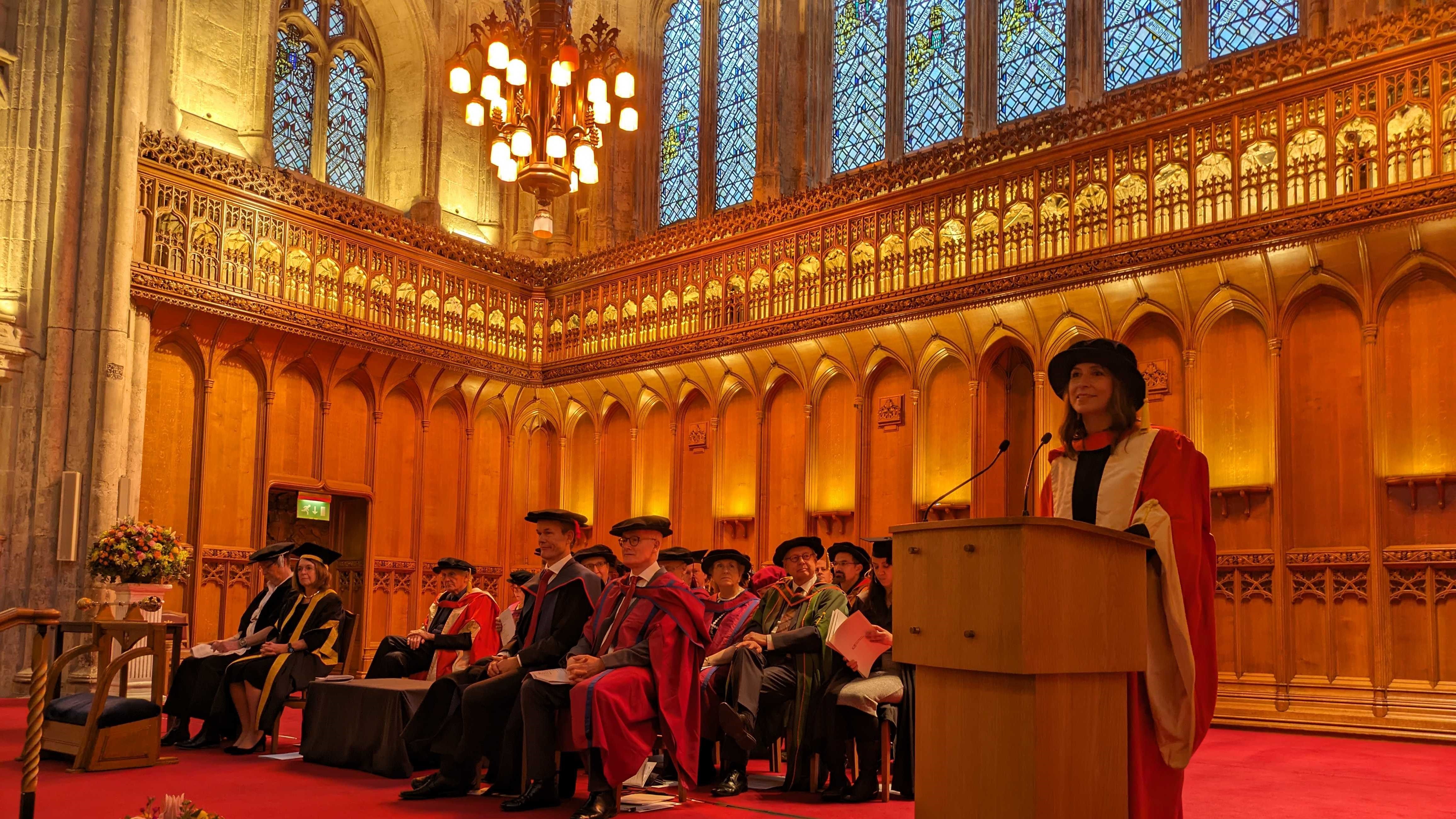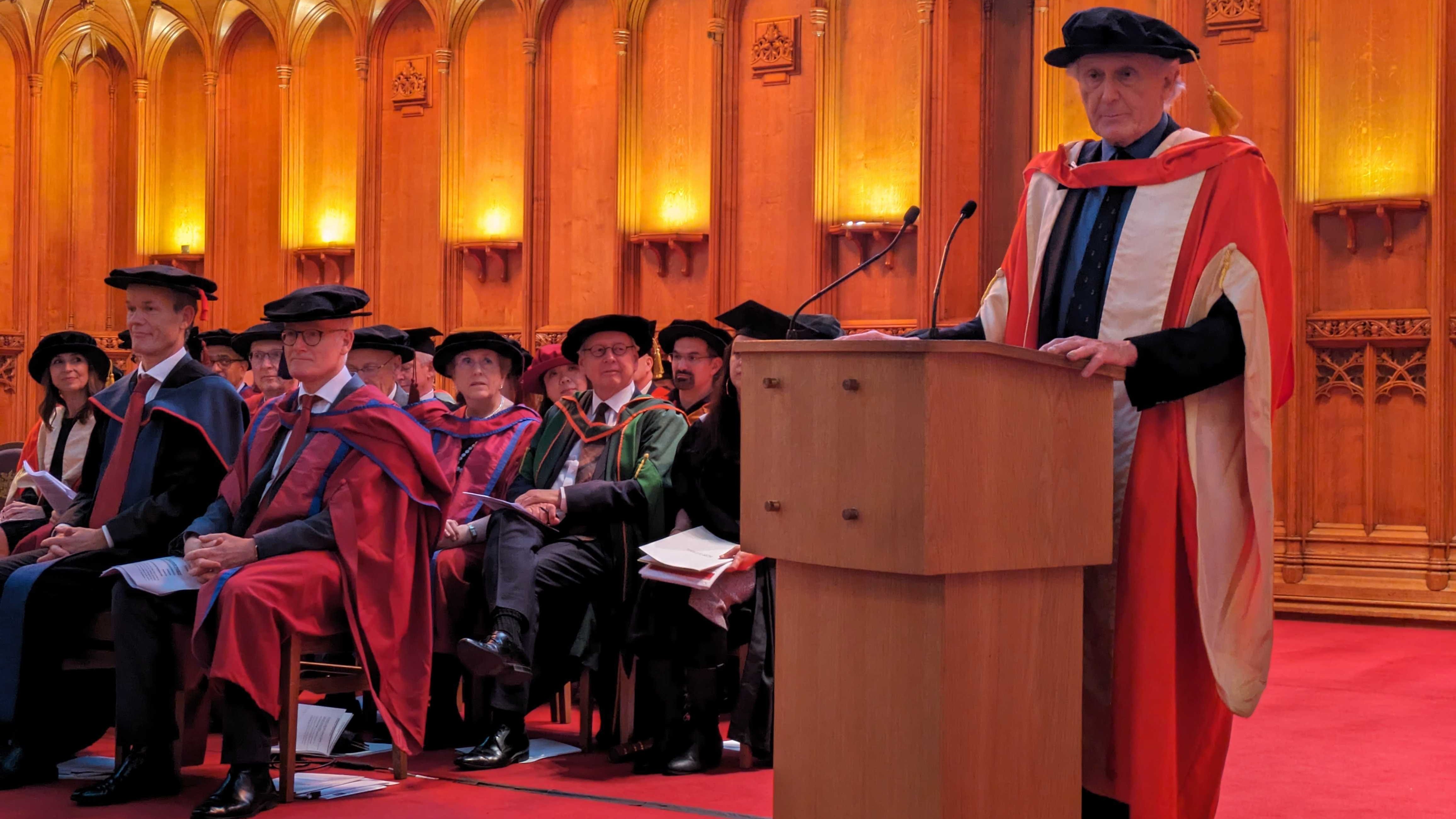
Image: Lola Manterola speaking at the lectern after receiving an honorary doctorate.
The Institute of Cancer Research, London, is proud to honour the founder of the international cancer charity, CRIS Cancer Foundation, and a world-renowned cancer genetics researcher at this year’s graduation and awards ceremony.
The ceremony, which was held at Guildhall, City of London, was also an opportunity to celebrate the many student graduates from The Institute of Cancer Research (ICR), which is a member institution of the University of London.
Lola Manterola was honoured for her outstanding support of the ICR’s mission and her leadership in collaborative international efforts to raise much-needed funds for cancer research through CRIS Cancer Foundation.
Together with her husband, Diego, Lola set up CRIS Cancer in 2011, after she overcame a deadly form of myeloma blood cancer. Lola’s cancer was advanced at diagnosis, and thought to be incurable – she was given just four months to live.
Diego found her a place on a clinical trial, which led to Lola’s successful treatment – and inspired them to recognise the importance of such trials and of funding cancer research. Since founding CRIS Cancer, they have given out more than £50m in grants and fellowships for cancer research – and helped fund almost 500 clinical trials.
Uniting many to make a difference
Professor Paul Workman, Harrap Professor of Pharmacology and Therapeutics at the ICR, who presented Lola for the honour at the ceremony and serves as President of the CRIS International Scientific Committee, said:
“I have always been astonished by Lola’s energy. Over the last 13 years since CRIS was founded, she has united researchers, clinicians, care teams, hospitals, research institutes, schools, charities, companies, donors, patients, and families to find ways to treat cancers that were previously incurable.
“Lola very much sees her work as a global endeavour and, at the ICR, we’re proud to have received strong and consistent support for our research – across a number of projects and areas. We’re humbled to be a part of Lola’s incredible efforts to give hope to the many other patients who do not respond to standard treatments. She is inspirational, passionate and, as we can see from the impacts the charity has made so far, extremely effective.”
Lola Manterola, co-founder of CRIS Cancer Foundation, said:
“I’m honoured to receive this recognition from the ICR. It’s been more than ten years since we founded CRIS and I’m so proud of what we’ve achieved so far. Thank you so much to all our donors and supporters who have helped us to fund such an incredible amount of research around the world – with their continued support, I’m confident we can achieve even more to help people with cancer.”
A lifesaving legacy in cancer genetics
Professor Sir Bruce Ponder was honoured for his outstanding contributions to cancer research as an exceptional leader in the field of cancer genetics, and for his pioneering work in cancer predisposition genes.
Earlier in his career Professor Sir Bruce worked at the ICR as a researcher in cancer genetics while also practising as a clinician at The Royal Marsden. In 1993, after moving to the University of Cambridge, he was the first to identify that the RET gene was involved in cancer. People who inherit the RET gene are at increased risk of developing thyroid cancer, and RET mutations are linked to more aggressive disease. The discovery helped to improve guidelines for management of families with thyroid cancer.
Professor Sir Bruce was involved in the identification of the BRCA2 gene in 1995 – a discovery which has helped transform genetic testing and treatment for women with breast cancer. In 1996, he became the Cancer Research UK Professor of Oncology in Cambridge, and in 2007 he was appointed Director of the Cancer Research UK Cambridge Institute. His emphasis on a bench-to-bedside approach ensured collaboration between the Cambridge Institute, the University of Cambridge, and Addenbrooke's Hospital, leading to Organisation of European Cancer Institutes (OECI) Comprehensive Cancer Centre status in 2013.
Later in his career, Professor Sir Bruce’s group at Cambridge focused on the use of genome-wide association studies to identify susceptibility to breast and lung cancers. He was elected a Fellow of the Academy of Medical Sciences in 1998, Fellow of the Royal Society in 2001, and knighted for Services to Medicine in the 2008.

Image: Professor Sir Bruce Ponder speaks at the lectern after receiving an honorary doctorate.
An inspirational mentor and leader
Professor Ros Eeles, Professor of Oncogenetics at the ICR and Consultant in Clinical Oncology and Cancer Genetics at The Royal Marsden NHS Foundation Trust, who presented Professor Sir Bruce for the honour at the ceremony, said:
“Sir Bruce is considered to be the father of cancer genetics in the UK and has been a pioneering light in the field. He set up the Familial Cancer Clinic at The Royal Marsden – and expanded the service to other hospitals in London before there was much interest in the idea of tracing cancer through families. He was the first to do ‘Team Science’ in this field – he set up and chaired the International Breast Cancer Linkage Consortium, inspiring similar consortia in other cancers.
“Alongside his work in discovering RET, which led to lifesaving changes in how we manage cases of thyroid cancer in families, Sir Bruce has been an inspirational leader. He built up Cambridge into a centre of excellence in cancer research and he has inspired, mentored and trained so many of the major researchers in cancer genetics internationally.”
Professor Sir Bruce Ponder, Emeritus Professor of Oncology at the University of Cambridge, said:
“My career in cancer genetics was born at the ICR and The Royal Marsden so it’s incredibly special to receive this honour from the ICR. If I’d not offered to help busy colleagues at the thyroid clinic next door to my urology one, things could have turned out quite differently.
“I’ve always believed research is a team pursuit – and that is particularly the case when hunting cancer genes. I’d like to thank my many colleagues and all of the patients who have contributed to my work over the decades.”
Prizes and celebrations for the ICR’s graduates
Friends, family and colleagues gathered to celebrate the ICR’s many graduates on the stage at Guildhall.
At the ceremony, the ICR recognised the hard work and achievements of 1 MPhil and 48 PhD graduates and 9 MD(Res) students, as well as 13 students who graduated with an MSc in Oncology and 73 students who achieved other postgraduate awards in Oncology.
Professor Julia Buckingham, Chair of the ICR’s Board of Trustees, presented the winner of the Chairman’s Prize for the outstanding graduating MD(Res) student to Elizabeth Cartwright for her thesis entitled “Targeting DNA damage response in oesophagogastric cancer”.
Professor Julia Buckingham also presented the winners of the Chairman’s Prize for the outstanding graduating PhD students to Sarah Anne Bird and John Hardman.
Sarah’s thesis was entitled: “Unravelling the mechanisms of acquired immunomodulatory drug resistance in multiple myeloma”. John’s thesis was entitled: “Surgeon-led multi-centre collaborative research in head & neck cancer: studies in remote triage, transoral robotic surgery for recurrent disease and consensus management in unknown primary disease”.
Professor Kevin Harrington, Professor of Biological Cancer Therapies at the ICR, who represented the Dean for Academic and Research Affairs at the ceremony, said:
“Our programme of postgraduate training is at the heart of everything that the ICR does, and we’re delighted and proud to be able to recognise the hard work of our graduating students – particularly as so many of them had to adapt to the challenges brought on by the pandemic during their studentships.
“I’m certain that many of our graduates will go on to be leaders in their respective areas of specialty – and I hope they will also contribute to supporting future generations of students who follow in their footsteps. We wish them well in the next steps in their careers.”